📋 Group Discussion Analysis Guide
🌟 Should Corporate Tax Rates Be Standardized Globally?
🌐 Introduction to the Topic
- Opening Context: “In a rapidly globalizing economy, corporate tax standardization is debated as a potential mechanism to curb tax evasion and foster economic fairness. However, it also raises concerns about sovereignty and economic disparity.”
- Topic Background: The debate on global corporate tax harmonization gained momentum with the OECD’s Base Erosion and Profit Shifting (BEPS) initiative and the 2021 agreement on a global minimum tax rate of 15% for multinational corporations. This development aims to prevent profit shifting to low-tax jurisdictions.
📊 Quick Facts and Key Statistics
- 🌍 Global Minimum Tax Rate Agreement (2021): 138 countries supported a 15% corporate tax floor, covering 90% of the global economy.
- 💸 Tax Havens’ Loss Impact: $240 billion lost annually due to tax avoidance (OECD, 2023).
- 📈 Corporate Tax Rates Variability: Ranges from 0% (Bermuda) to 31% (Brazil).
- 💼 Revenue Dependence: Developing countries derive up to 30% of revenues from corporate taxes, versus 10% in developed nations.
👥 Stakeholders and Their Roles
- Governments: Regulate tax structures, address revenue generation needs, and balance economic competitiveness.
- Multinational Corporations (MNCs): Impacted by tax standardization, with implications for profit margins and compliance.
- International Organizations: OECD, IMF, and UN promote guidelines and frameworks for tax reform.
- Citizens and Small Enterprises: Indirectly influenced by tax policies through public service funding and economic conditions.
🏆 Achievements and Challenges
🌟 Achievements
- OECD Framework: Enhanced collaboration against tax base erosion.
- Improved Transparency: Global reporting standards deter profit shifting.
- Stabilized Competition: Minimum tax reduces race-to-the-bottom dynamics.
⚠️ Challenges
- Sovereignty Concerns: Countries fear losing control over fiscal policy.
- Disparity: Uniform rates may disproportionately affect developing nations.
- Implementation Complexity: Aligning diverse tax systems faces legal and logistical barriers.
🌍 Global Comparisons
- Success: EU’s tax harmonization efforts improved fair competition.
- Challenges: African nations worry about loss of competitiveness.
📚 Case Studies
- Ireland’s Low-Tax Model: Its 12.5% corporate tax rate attracts major tech firms but faces global scrutiny.
- Kenya’s BEPS Compliance: Struggles to balance foreign investment and tax standardization.
🗣️ Structured Arguments for Discussion
- Supporting Stance: “Global tax standardization ensures fairness, curbs tax havens, and levels the playing field.”
- Opposing Stance: “A universal tax undermines national sovereignty and overlooks diverse economic realities.”
- Balanced Perspective: “Standardization offers benefits, but flexibility is crucial to address individual country needs.”
🎯 Effective Discussion Approaches
🌟 Opening Approaches
- “The OECD estimates $240 billion is lost annually due to tax avoidance—a staggering call for harmonized policies.”
- “Countries like Ireland attract firms with low taxes, but is it fair competition or fiscal manipulation?”
⚡ Counter-Argument Handling
- Rebuttal to Sovereignty Concern: “Collaboration doesn’t mean losing sovereignty; it ensures mutual benefits through shared frameworks.”
- Rebuttal to Impact on Developing Nations: “Global tax redistribution mechanisms can address disparities.”
🔍 Strategic Analysis of Strengths and Weaknesses
- Strengths: Greater transparency, reduced profit shifting, stabilized global competition.
- Weaknesses: Complexity in implementation, potential economic disparities.
- Opportunities: Strengthened global cooperation, equitable resource distribution.
- Threats: Resistance from tax havens, political disagreements.
🎓 Connecting with B-School Applications
📚 Real-World Applications
- Relevant to international finance, taxation policy projects, and strategic management courses.
❓ Sample Interview Questions
- “How would global tax standardization affect MNCs?”
- “Discuss the potential impact of a 15% minimum tax on emerging markets.”
💡 Insights for B-School Students
- Focus on balancing compliance with innovation.
- Study global economic impacts for future financial planning.


